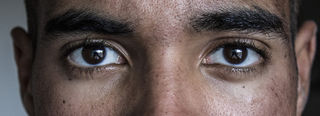Fear
What Happens When Someone Stares at You
Whether we approach or avoid a dominant person largely depends on our status.
Posted June 22, 2017 Reviewed by Jessica Schrader
Key points
- A person's perception of their own status may explain why they act certain ways around superiors, equals, or those in positions of less power.
- People who consider themselves to be in positions of high power are more likely to smile back at those they think have less power.
- Research suggests those who are intimidated by others could change their behavior by recalling a memory in which they felt extremely powerful.

Being stared at can make many people feel highly uncomfortable and look away. This response to another person's apparent visual display of dominance has long been attributed to how evolution has conditioned us to respond to threats and also to how accustomed we've become, as a species, to inferring our place in a perceived social hierarchy: If someone is staring us down and we grow uncomfortable, we may, on a gut-level, infer we are of a lower status.
But if we're primed to feel more powerful, does another person's unabating gaze have the same effect on our sense of status, and how uncomfortable we feel in the moment? A team of researchers led by Mario Weick of Kent's School of Psychology investigated whether feelings of power changed people's responses to displays of dominance, such as staring.
In the first study, 80 people (34 women, 44 men) were recruited to a lab and randomly assigned to low-power, neutral, and high-power groups. Those in the low-power group were instructed to write about a past event that made them feel disempowered; those in the neutral group were instructed to write about an event that did not significantly affect their sense of power; and those in the high-power group were instructed to write about a past event that made them feel powerful.
All participants were then outfitted with a virtual reality headset inside a large room and told to approach and walk around a virtual target. Participants performed this activity twice. In one trial, the target looked like a robot; in the other, the target looked like a human.

Weick et al. found that participants who'd written about a past experience in which they felt powerful were more likely to approach targets that gazed directly at them. This contrasted with participants who'd written about past experiences that were neutral or involved feeling disempowered. Intriguingly, these differences only occurred when the target doing the staring at participants looked like a human—indicating to the researchers "that social motives may underpin the effects of power. In particular, the differential responses to the human target may be triggered by an implicit desire to signal hierarchical relations to conspecifics. This pattern of results is consistent with Hietanen and colleagues’ (2008) finding that gaze-induced approach and avoidance tendencies are stronger for stimuli with a high degree of realism."
"Crucially," Weick et al. explain in a forthcoming edition of Personality and Social Psychology Bulletin, "across trials the two targets also displayed different gaze behaviors and either made a head movement turning toward, and persistently gazing at, the participants traversing the room (looking toward), or did not move and looked ahead, thus ignoring the participants during the locomotion task (looking ahead). In both gaze conditions, the virtual characters had their eyes open, blinked from time to time, and performed small idling (humanoid) or rotation (robot) movements."
Being primed to feel more powerful, neutral, or less powerful did not impact participants' approaches to human- or robot-like targets that did not sustain eye contact or gaze directly at them.
In a second study, Weick et al. replicated the previous findings but added a few new flourishes: In addition to staring at the participants, the robots and human-like targets looked away from them. The targets were also depicted as either male or female across various trials, and differed in height, such that participants perceived themselves as taller or shorter than the targets.
This time, 103 students took part in the study (76 females and 24 males). Of these participants, those who perceived targets as physically shorter were more likely to approach them—even (and especially) if targets maintained a strong degree of eye contact. The gender of the target (as well as the gender of the participants) did not, however, have any effect on whether participants approached or avoided getting close to the targets when navigating around them.
Weick et al. reasoned that height is another communicator of status, with shorter targets appearing less threatening and perhaps even more inviting when making eye contact. This isn't the first time that height has impacted whether people walk up to or avoid an individual based on that individual's stature. A classic study conducted in the early 1980s positioned two people at opposite ends of a commuter train. One was short; the other, tall. The researchers conducting this study found that passersby were far more likely to approach the shorter person than the taller one.
Weick et al.'s virtual reality study also isn't the first to find that how powerful we feel affects how we react to others. In 2014, researchers from the University of California, San Diego examined how perceiving oneself to be high or low in status altered how readily people reciprocated others' smiles. They found that people who considered themselves to be in positions of high power were more likely to smile back at people they perceived to be in positions of low power and less likely to smile back at those they perceived to be in positions of high power. Meanwhile, people who perceived themselves to be in positions of low power were more likely to smile back at anyone who smiled at them, regardless of that initial smiler's assumed status.
Smiling back at a lower-status individual but not a higher-status one, if one assumes oneself to be powerful, could boil down to feeling intimidated by a fellow high-status individual. Individuals in positions of power may feel that they have a tenuous grasp on their status in the presence of others who may unseat or edge them out. Not smiling at those they perceive to be equally or potentially more powerful could be a way of holding their own, effectively putting on a tough face to continue to assert their dominance, so as to maintain their position. Smiling at those they perceive to be of lower status may come about as they see the lower status individual as unthreatening, meaning he or she couldn't possibly unseat the more powerful person and thus does not need to be shown a display of dominance in the form of refraining from smiling.
On the other hand, that lower-status individuals return the smiles of pretty much anyone could indicate that these individuals aren't as concerned about losing their grip on power, as they don't even have one, so there's not as much to fret about. Or perhaps universal smiles may be a strategy used by a lower-status individual to curry favor with higher-status people. A smile might also be a way to communicate to higher-status individuals that a lower-status person is not a threat and, thus, does not deserve to be on the receiving end of that individual's punishment or other negative behavior — actions that a higher-status individual may engage in to re-assert dominance over those he or she perceives as competitors.
A smile contrasts with a sustained gaze in that the former is typically a show of nicety, warmth, and agreeability, and the latter is often a sign of dominance or power. (There are exceptions, such as when you stare into the eyes of a lover, but a stare typically indicates—and is perceived as—aggression, toughness, or creepiness.) While perceiving ourselves to be high in power may make us less likely to return the smile of a person whom we fear may elbow us out of our superior position in a social hierarchy, returning the gaze of—or, in the case of Weick et al.'s study, heading straight ahead without avoiding—a person who is staring at you may be a means of proving your status, no matter how intimidating that other may look to someone else. To approach is to show no fear.
Perhaps a future study should examine whether high-power individuals who are more inclined to walk toward a target who's staring at them would refrain from smiling if that target also smiled at them while staring. Such a study could also explore whether a participant in a position of low power being stared at by a smiling target of higher power may avoid that target but smile in deference while walking away.
What we can take away from this study is that how high or low we feel on the social hierarchy may be a strong explanation for why we act certain ways around superiors, equals, or those in positions of less power. Try observing those you avoid, approach, smile back at, or refrain from smiling back at over the next few days and ask yourself: Where do I see myself in relation to this other? If you find yourself too often intimidated by others, perhaps you may wish to recall a memory in which you felt extremely powerful and see whether it helps you become less likely to circumvent a powerful boss or colleague shortly thereafter. (Just don't blame us if you're criticized for not smiling enough!)




